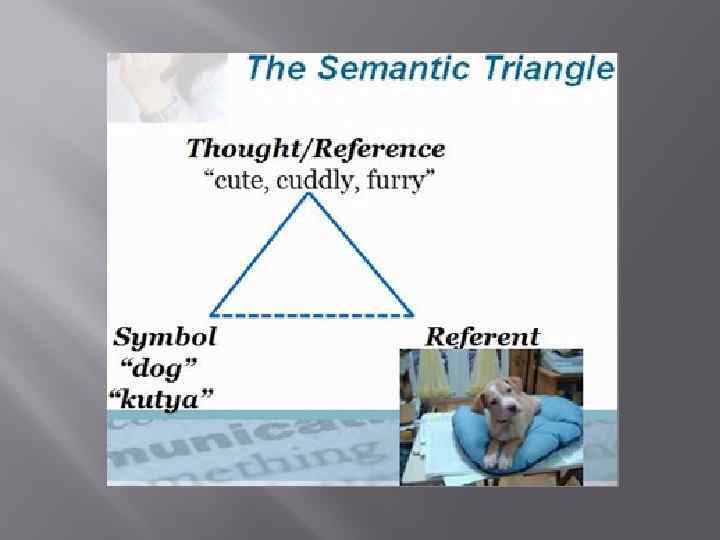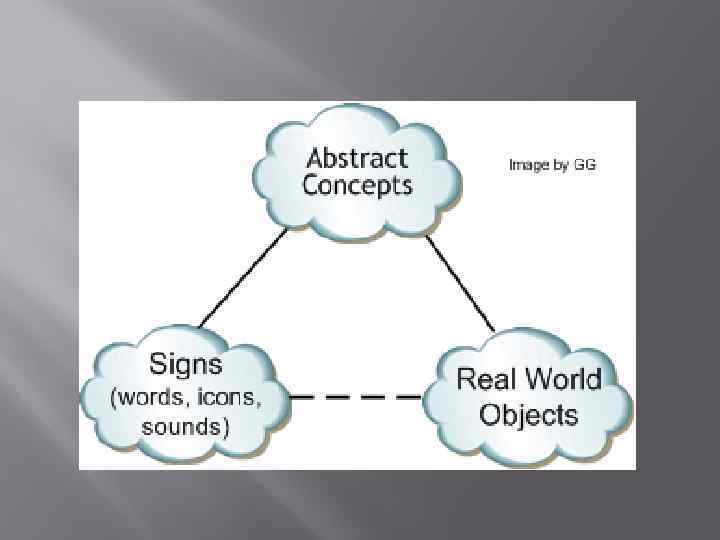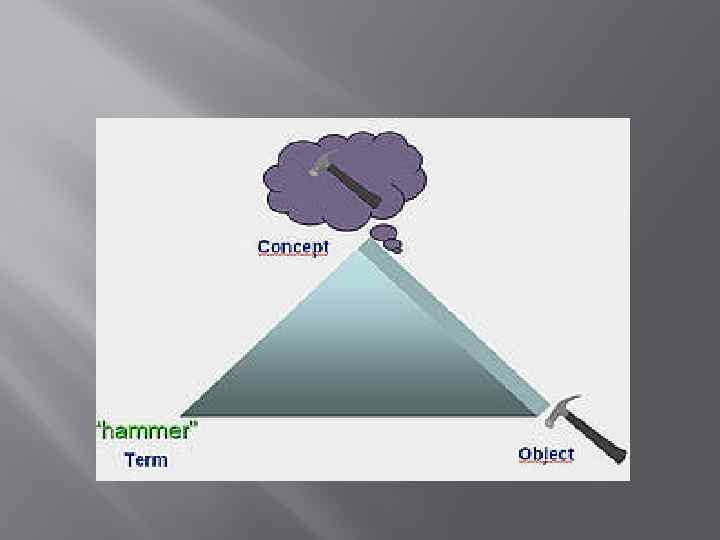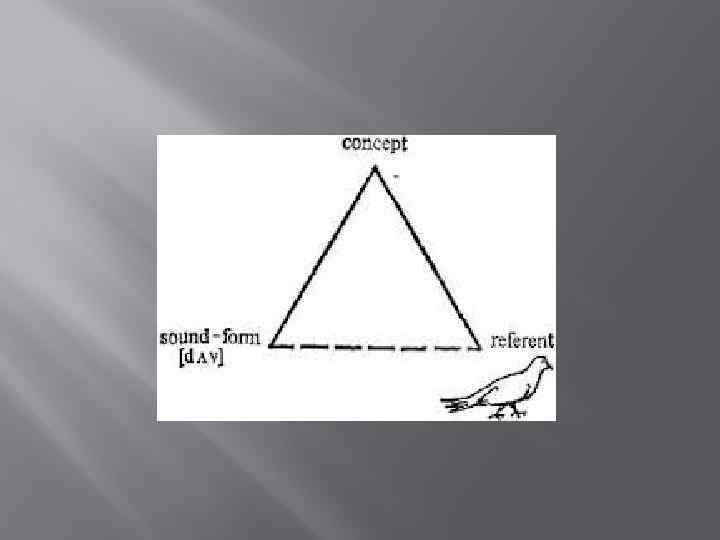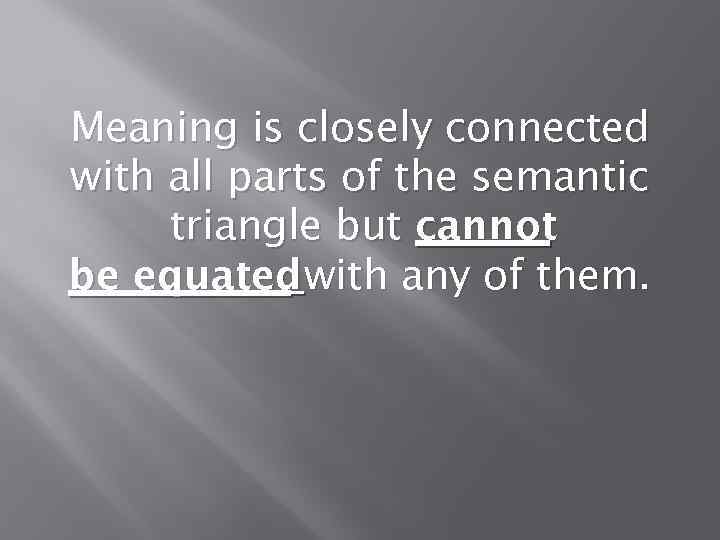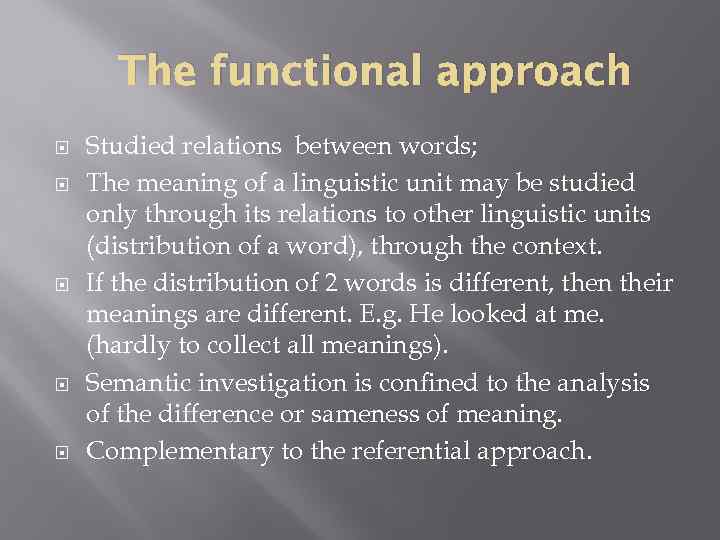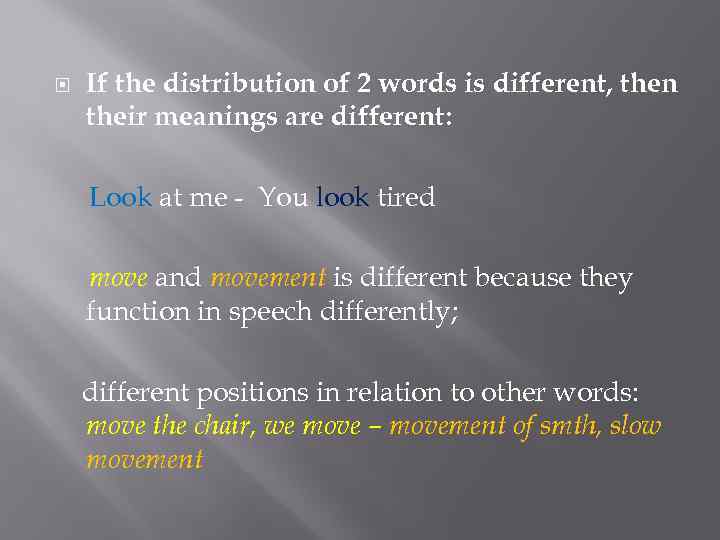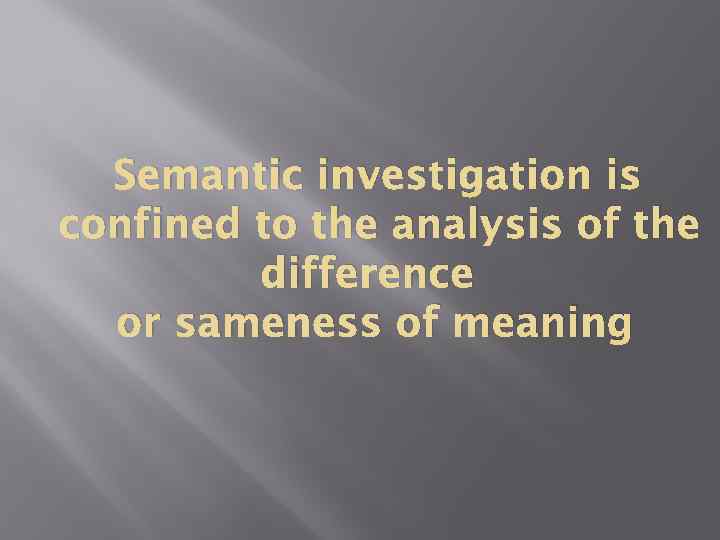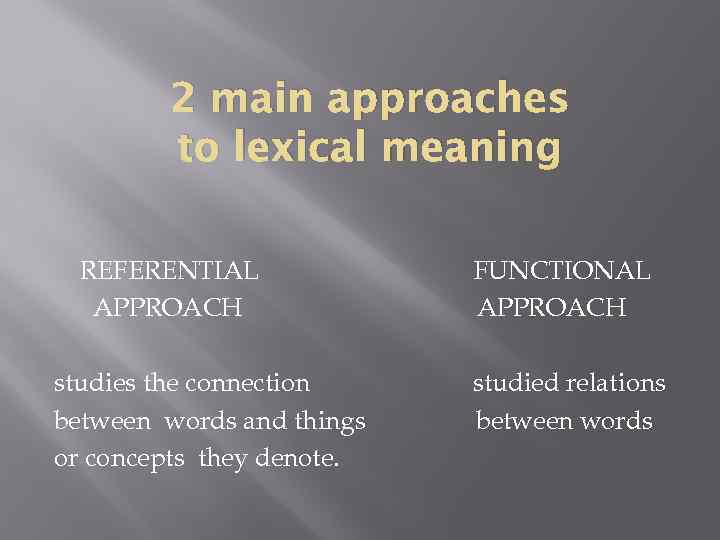There
are three classical theories of meaning:
-analytical
or referential
(F.de
Saussure’s disciples)
Meaning
is the relation between the object or phenomenon named and the name
itself;
-notional
or
conceptual (Aristotle,
John Locke, A.I. Smirnitskiy, etc.)
Meaning
is a certain representation
of an object / phenomenon / idea / relation in the mind;
—functional
or
contextual (L. Bloomfield)
Meaning
is the situation in which a word is uttered, i.e. its context.
22. Types and aspects of word meaning.
Aspects
of Meaning
-Objective
aspect (denotation): word ↔ referent;
-Notional
aspect, i.e. significant features common for classes of objects
(signification): word ↔ sense;
-Pragmatic
aspect, i.e. the speaker’s attitude to the referent (connotation);
-Systemic
or differential aspect, i.e. the relations of the signified word with
other words within a word-group or in speech.
Types
of meaning:
Word-meaning
is not homogeneous but is made up of various components the
combination and the interrelation of which determine to a great
extent the inner facet of the word.
Grammatical
meaning
is the meaning which unites words into big groups such as parts of
speech or lexico-grammatical classes. It is recurrent in identical
sets of individual forms of different words, e.g. stones,
apples, kids, thoughts have
the grammatical meaning of plurality.
Lexical
meaning
is the meaning proper to the word as a linguistic unit; it is
recurrent in all the forms of this word and in all the possible
distributions of these forms, e.g. the word-forms write,
writes,
wrote,
writing,
written
have different grammatical meanings of tense, person, aspect, but the
same lexical meaning ‘to make letters or other symbols on a
surface, especially with a pen or pencil’.
Components
of Lexical Meaning
Lexical
meaning is not homogenous either and may be analysed as including
denotative and connotative components.
Denotative
(denotational) (Lat. denotatum
‘signified’) component is the conceptual content of the word
fulfilling its significative and communicative functions; our
experience is conceptualised and classified in it.
Connotative
(connotational) (Lat. connoto
‘additional meaning’) component conveys the speaker’s attitude
to the social circumstances and the appropriate functional style,
one’s approval or disapproval of the object spoken of, the
speaker’s emotions, the degree of intensity; unlike
denotations or significations, connotations are optional.
Types
of Connotations
Stylistic
connotation
is concerned with the situation in which the word is uttered, the
social circumstances (formal, familiar), the social relationships
between the communicants (polite, rough etc.), the type and purpose
of communication, e.g. father
(stylistically neutr.), dad
(colloquial), parent
(bookish).
Emotional
connotation
is acquired by the word as a result of its frequent use in contexts
corresponding to emotional situations or because the referent
conceptualised in the denotative meaning is associated with certain
emotions, e.g. mother
(emotionally neutr.), mummy
(emotionally charged); bright
(emotionally
neutr.), garish
(implies negative emotions).
Evaluative
connotation
expresses approval or disapproval, e.g. modern
is often used appreciatively, newfangled
expresses disapproval.
Intensifying
connotation
expresses degree of intensity, e.g. the words magnificent,
gorgeous, splendid, superb
are used colloquially as terms of exaggeration.
Соседние файлы в предмете [НЕСОРТИРОВАННОЕ]
- #
- #
- #
- #
- #
- #
- #
- #
- #
- #
- #
WORD-MEANING Referential and functional approaches to meaning
SEMASIOLOGY – is the branch of lexicology which studies the semantic of linguistic unit (word meaning) THE WORD — is the smallest and basic linguistic unit. SEMANTIC — is the meaning of words, expressions or grammatical forms.
Word-meaning is one of the controversial terms in linguistics; there had been many attempts to give the most complete definition of word-meaning; In modern linguistics there are 2 main approach to meaning : a) the referential approach b) the functional approach
2 main approaches to lexical meaning REFERENTIAL APPROACH FUNCTIONAL APPROACH
The referential approach distinguishes the three components: 1. The sound-form (Sign) of the word: [bз: d]. 2. The referent (Denotatum) – the object which the word names: the actual bird. 3. The concept (Designatum) – The essential properties of this object which are reflected in human mind: “a feathered animal with wings“.
“basic (semantic) triangle” ( referential model of meaning) ]]
Meaning is closely connected with all parts of the semantic triangle but cannot be equated with any of them.
The functional approach Studied relations between words; The meaning of a linguistic unit may be studied only through its relations to other linguistic units (distribution of a word), through the context. If the distribution of 2 words is different, then their meanings are different. E. g. He looked at me. (hardly to collect all meanings). Semantic investigation is confined to the analysis of the difference or sameness of meaning. Complementary to the referential approach.
If the distribution of 2 words is different, then their meanings are different: Look at me — You look tired move and movement is different because they function in speech differently; different positions in relation to other words: move the chair, we move – movement of smth, slow movement
Semantic investigation is confined to the analysis of the difference or sameness of meaning
2 main approaches to lexical meaning REFERENTIAL APPROACH studies the connection between words and things or concepts they denote. FUNCTIONAL APPROACH studied relations between words
|
Download 68 Kb.
|
Bog’liq
tarix, Variant 2020 [ENGLISHDTM] , Variant 2020 [ENGLISHDTM] , OSCE PA Research Assistant Application Form, см2, см2, NAZORAT TESTI № 2, NAZORAT TESTI № 2, NAZORAT TESTI № 2, relative-clauses, заявка темир йўл, 5847409, 5847409, dasturlashga doir masalalar
Semasiology
-
The Definition of Meaning
-
Types of Meaning
-
Motivation of the Word
-
Semantic Change: causes, nature and results
-
Polysemy.
1. The Definition of Meaning
The definition of the meaning is especially difficult due to the complexity of the process by which language and human consciousness serve to reflect the reality and adopt it to human needs. Nowadays there is no universally accepted definition of the meaning, or rather a definition all the basic features of meaning and being simultaneously time operational.
The branch of lexicology devoted to the study of meaning is called semasiology.
Meaning is a realization of a notion or a motion by means of definite language system.
The modern approach to semasiology is based on the assumption that the inner form of the word presents a structure which is called the semantic structure of the word. The basic principle of a structural semantic approach is that words do not exist in isolation. The meanings of words are defined through the sense relations they have with other words.
There are different approaches to define the meaning of the word.
Do’stlaringiz bilan baham:

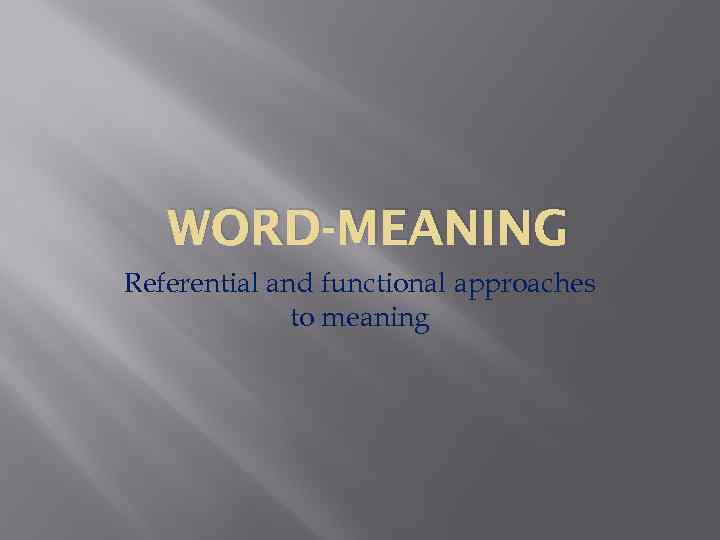
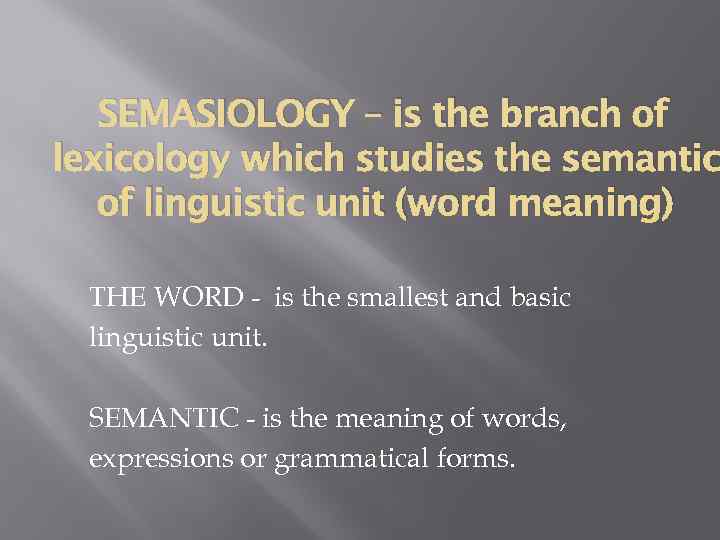
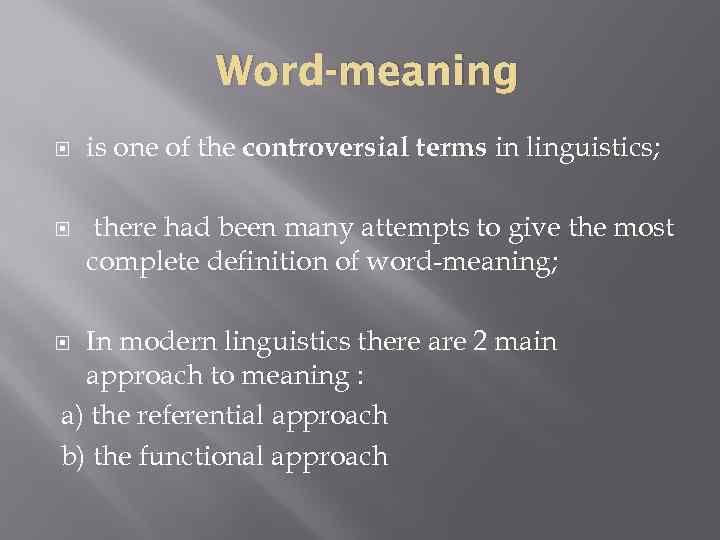
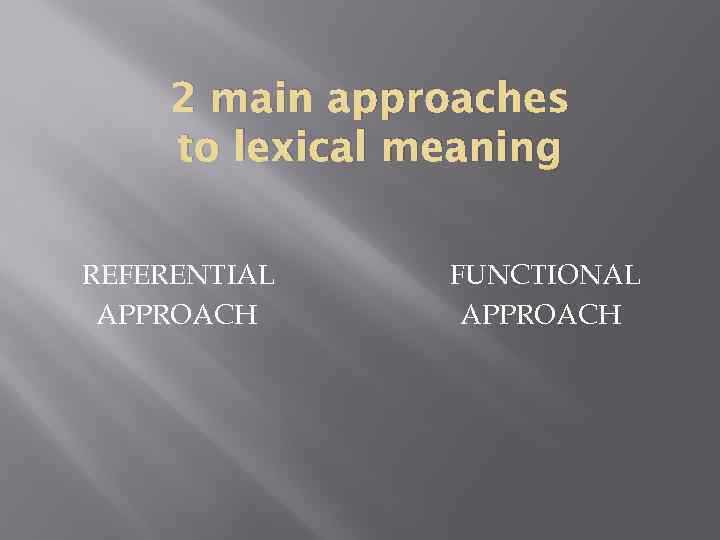
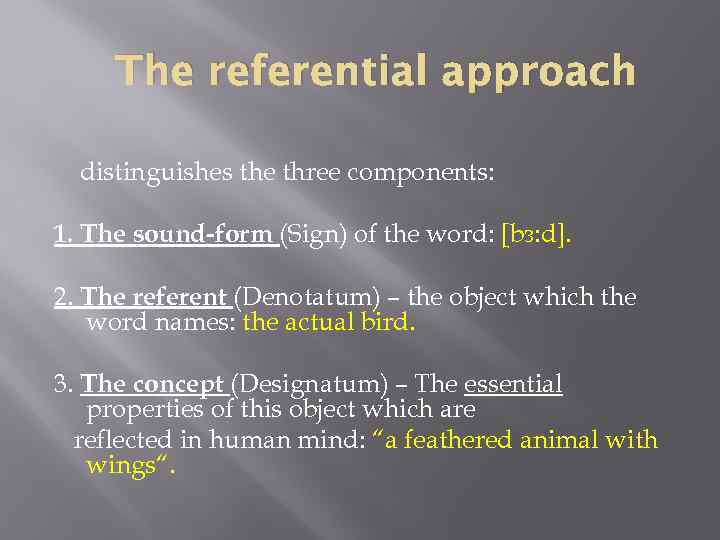
![“basic (semantic) triangle” ( referential model of meaning) ]] “basic (semantic) triangle” ( referential model of meaning) ]]](https://present5.com/presentation/1/-35581311_174906351.pdf-img/-35581311_174906351.pdf-6.jpg)
